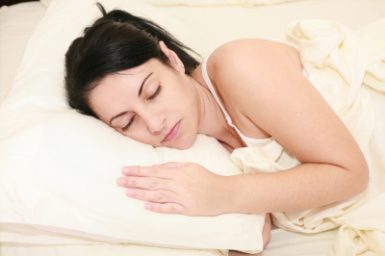 For thousands of years, the sleep and wake cycles of human beings have largely evolved to be in synchronistic formation with the rhythms of nature and cycles of the seasons. Before electricity, people would naturally wake upon sunrise and fall asleep shortly after sundown. Sleep disorders were rare hundreds of years ago and infrequently mentioned in the older classical Chinese Medicinal and acupuncture texts. It wasn’t until the last hundred years or so, after the advancement of modern technology, that humans started to experience more sleep issues.
For thousands of years, the sleep and wake cycles of human beings have largely evolved to be in synchronistic formation with the rhythms of nature and cycles of the seasons. Before electricity, people would naturally wake upon sunrise and fall asleep shortly after sundown. Sleep disorders were rare hundreds of years ago and infrequently mentioned in the older classical Chinese Medicinal and acupuncture texts. It wasn’t until the last hundred years or so, after the advancement of modern technology, that humans started to experience more sleep issues.
Modern technology, although wonderful in its myriad of positive contributions to the human experience, is not always as conducive when it comes to natural sleep bio-rhythms. In modern times, we often find ourselves awake and overstimulated long after sundown. This desynchronization with natural rhythms can adversely affect our capacity to indulge in a restful night’s sleep and could eventually, over time, negatively impact our health.
As an acupuncturist, it’s part of my job is to evaluate biological rhythms and patterns within the body. When a patient comes into my clinic with specific sleep concerns, I consider many factors, including the natural flow of vital energy, or Qi, through the body as it corresponds to the ancient system of the Chinese Bio-Clock. Although developed over 2,000 years ago, the Chinese Bio-Clock is strikingly similar to the more modern, Nobel Prize winning concept of Circadian Biology or Chronobiology, as both systems explore the way in which internal clocks or circadian rhythms affect sleep and the internal organs.
The main difference between the two schools of thought is that Traditional Chinese Medicine (TCM) evaluates daily rhythms and imbalances with a more energetic lens, based on the way in which Qi circulates through the organs within a 24-hour period. Circadian Biology, on the other hand, assesses daily oscillations on a more molecular level. Both perspectives are significant and add valuable insight into various physiological processes of the human body.
For acupuncturists, understanding the energetic rhythms of the Chinese Bio-Clock is especially valuable when treating sleep disturbances, especially for those who are prone to waking up in the middle of the night at specific times, and who are unable to fall back to sleep easily. In the Chinese Bio-Clock system, each meridian represents an organ system within the body, and each organ system is more strongly affected by Qi flow during certain hours. Below we will examine the Chinese Bio-Clock organ systems, the corresponding hours of predominant energetic activity, and how these rhythms affect sleep.
Triple Burner
9pm – 11pm
In TCM theory the Triple Burner system is known to control fluid metabolism and can be closely tied to the endocrine and lymphatic systems. Most energetically active during 9pm-11pm, the Triple Burner is most efficient during what ideally would kick off the first half of the sleep cycle, initiating Slow Wave Sleep (SWS). During SWS the hormone cortisol is reduced, allowing the body to better relax and restore itself. Some of the best physiological restoration occurs during the first phase of sleep so it’s no surprise that the Triple Burner is most active during these hours.
Gallbladder
11pm – 1am
The gallbladder stores and secretes bile, which greatly aids in digestion and helps break down fats. In TCM, it is also responsible for tendons and sinews as well as decision making and courage. Sometimes waking up during gallbladder hours can signify a digestive issue, tendon issue, or a difficult decision. If you find you are waking up between these hours it might be best to avoid fatty foods and snacking before bed.
Liver
1am – 3am
In TCM, the liver is responsible for detoxification of harmful substances and emotional processing. It is associated with the emotion anger. Thus, if you find that you are waking up during liver hours, you might be in a period of high stress or have unresolved anger. Consider constructive ways to unwind such as acupuncture, exercise, deep breathing, and/or meditation. It is also beneficial to stay away from unhealthy foods and alcohol as they can hinder the liver’s ability to efficiently detoxify the body.
Lung
3am – 5am
The lung system in TCM is related to the immune and respiratory systems, and its corresponding emotion is grief. Waking up during lung hours may possibly denote feelings of depression, sadness, or grief. Other imbalances within the lung system include allergies, colds, asthma, shortness of breath, respiratory, or immune conditions. If waking up during lung hours, consider yoga and deep breathing exercises to help strengthen and improve lung capacity. It is also advisable to address feelings of sadness or grief by talking to a friend, loved one, or therapist, or through meditation or journaling.
Realizing the connection between how energy moves through both the Bio-Clock organ system and within nature during daily and seasonal cycles can be of great benefit to our health and wellbeing.
In Chinese medicine there is an old adage, “As above so below,” which helps us understand congruences between the cyclical fluctuations of nature in relation to the rhythms and cycles of the human body. In other words, it is as though the human body can be viewed as a miniature representation of the natural world. It’s also a good reminder to better align ourselves with more natural cycles. This could be as easy as not using electronic devices an hour or two before sleep, or for a more systemic whole-body approach you could realign your natural sleep rhythms through acupuncture.
Could supplements also help with different sleep problems? For sure, yes, although not everyone responds to just melatonin. As one of our many wonderful wellness experts at Peoples Rx, I will often point customers in the direction of excellent pharmaceutical-grade supplements that can address specific issues, such as trouble falling asleep due to racing thoughts, or difficulties with waking up in the middle of the night. Cortisol Manager by Integrative Therapeutics, Inc. and Kavinace PM by Neuroscience are two such products our customers experience great success with. Our highly trained wellness staff can assist you in choosing what may work best for your specific sleep concerns.
Should you consider acupuncture to help with a sleep issue, know that it is more than just the placement of needles; its core foundation is based on a deep understanding of complex patterns and cycles at work within the body. It operates on both a physical and energetic level to restore the body back into its natural balance and rhythm. Acupuncture does not only serve to improve the quality of your sleep but also greatly improves your mood and overall health.
Please visit www.zenpointacupuncture.org to learn more about acupuncture and set up a get well appointment.
If you have comments and/or questions about this blog, email us at blog@peoplesrx.com.
Astra Gordon,LAc, MAcOM, ACN is a licensed Acupuncturist and Herbalist. She has a Master’s degree in Acupuncture and Oriental Medicine from AOMA Graduate School of Integrative Medicine and a Bachelor’s degrees in Philosophy. She is licensed by the Texas Board of Medical Examiners and is a certified Applied Clinical Nutritionist.

